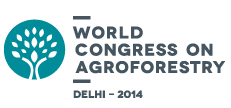REDD+ benefits to encourage good practices outside forest lands: a case study in Vietnam
REDD+ benefits to encourage good practices outside forest lands: a case study in Vietnam
wca2014-2042 Hoan T. Do 1,*Delia Catacutan 1 1World Agroforestry Centre (ICRAF) Vietnam, Hanoi, Viet NamVietnam has a long history of incentivizing stakeholders for forest protection and development through reforestation and conservation efforts, most recently a national programme on payment for forest environmental services (PFES). A benefit distribution system of PFES was formulated and identified as a prototype for REDD+’s benefit distribution and sharing (BDS). The questions remain on how the PFES-based REDD+’s BDS is designed to be compliant with international standards but yet locally appropriate, and how to ensure that the local communities have the share from the scheme while the legal framework for REDD+, particularly on carbon and land rights, is unclear and overlapping.
This paper examines the process of formulating a sub-national REDD+ BDS in Bac Kan province, northwest of Vietnam, with a view to minimize negative impacts from uneven forest/land resources accessing opportunities and maximize the share of local communities’ benefits through an innovative approach – reducing emissions from all land uses (REALU), e.g. incentivizing “carbon rich land uses” outside of forest, including agroforestry. We found that the BDS under REDD+/REALU in Bac Kan would likely work on the principles of PFES whereby land managers receive incentives for their conservation investments, with specific re-arrangements on land and forest tenure required. Local stakeholders’ preferences over land use right benefits clearly indicate the importance of formalized resource access rights in benefit sharing. We also found that incentivizing local communities to shift from current unsustainable land use practices to collective forest management and agrorforstry development activities will help to avoid land tenure gaps and create more motivations for participation than “only forestry” approaches. In sum, a REDD+ incentive system is possible within prevailing systems, with adjustments only at the level of local implementation provided local communities, authorities, and their myriad partners unilaterally agree to adapt, reflect, learn, and improve the system as deemed necessary.

